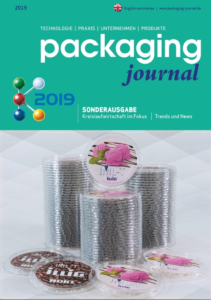 Bioplastics are a key driver for new developments in the plastic industry. The innovative materials play a key role in the transition to a circular economy, where fossil raw materials are substituted by renewable resources, and resource efficiency is at the forefront. The new German Packaging Law (VerpackG), which only came into effect in the beginning of this year, changed the framework conditions of an entire industry. Unfortunately, with regards to the promotion of innovative materials, which is explicitly included in the legal text, the implementation of VerpackG is still incomplete.
Bioplastics are a key driver for new developments in the plastic industry. The innovative materials play a key role in the transition to a circular economy, where fossil raw materials are substituted by renewable resources, and resource efficiency is at the forefront. The new German Packaging Law (VerpackG), which only came into effect in the beginning of this year, changed the framework conditions of an entire industry. Unfortunately, with regards to the promotion of innovative materials, which is explicitly included in the legal text, the implementation of VerpackG is still incomplete.
The amendment of VerpackG marks an important step into the right direction, towards a comprehensive circular economy and an efficient waste management. Unfortunately, so far the new regulations are limited to mechanical recycling, whereas organic recycling (composting) is left out. However, corresponding regulations for organic recycling applicable for a certain number of selected packaging would be of great relevance. Such products would support an efficient, separate bio waste collection.
Besides mechanical recycling, paragraph 21 of VerpackG also supports the bio-based plastics segment. In addition to the use of recyclates in packaging, the use of renewable resources for packaging is also included in the legal text. Due to a certain grade of contamination and special technical requirements, recyclates cannot be used for all kinds of packaging, e.g. food packaging. Thus, the need for a certain amount of so-called “virgin plastic” remains. In order to produce as sustainable as possible, these kinds of packaging should be produced from bio-based materials.
As an essential part of VerpackG’s implementation process, the Stiftung Zentrale Stelle Verpackungsregister (ZSVR) recently published minimum standards for the assessment of the recyclability of packaging. Unfortunately, by focussing exclusively on the criteria recyclability, the standards only reflect the status quo of the current recycling infrastructure. Further criteria, such as sustainability, raw material base, or the use of resources, are not included. So far, ZSVR has failed to establish real incentives for the promotion of innovative materials.
European Bioplastics invites the Federal Environment Agency as the implementing authority and ZSVR to take part in an active dialogue, which aims for a timely complete implementation of paragraph 21 of VerpackG. Thus, it remains to be seen what impact the further implementation of VerpackG will have for the bioplastics industry.
To read complete article in Packaging Journal, special edition “Kreislaufwirtschaft im Fokus” 2019 (in German) click here